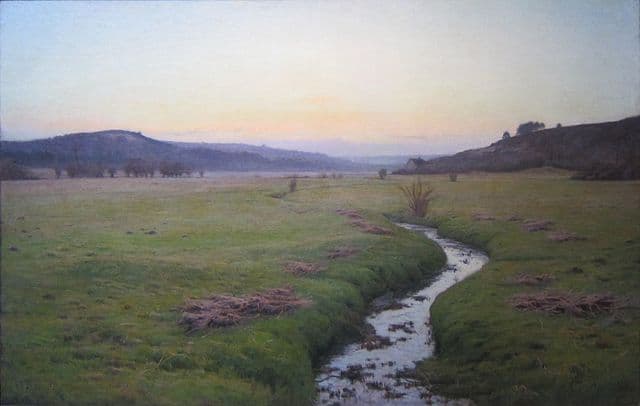Poem of the Day: ‘Hyla Brook’
What we love is not the reality before us, but our memory of something that is, for the time being, no more.

As we continue to celebrate the anniversary of the publication of Robert Frost’s 1923 book, “New Hampshire,” it makes sense to turn at least some of our attention to standout poems from collections that preceded it. As early as 1914, with the publication of “North of Boston,” when he was 40, Frost was beginning to write what in hindsight we think of as such quintessentially “Robert Frost poems” as “Mending Wall” and “The Death of the Hired Man.” The 1916 volume “Mountain Interval,” meanwhile, following fast on the heels of the previous book, continued to reflect the poet’s voice as it matured and more fully realized itself.
Today’s Poem of the Day, “Hyla Brook,” is a “Mountain Interval” poem. It keeps company with such better-known selections as “Birches,” “The Road Not Taken,” and the terrifying “Out, Out — ,” whose tragedy introduces most starkly the bleak seam that cuts through the New England beauty: a grief casting its shadow on the pastoral sunshine. “Hyla Brook” is almost a sonnet, fifteen pentameter lines instead of fourteen. Its intricate rhyme scheme, abbaccaddeefgfg, departs from the Petrarchan mode after the first quatrain. Although, in the beguiling music of the first line, we hear the brook’s “song and speed,” what transpires is that “the brook’s run out of” those things. The frog species which gives it its name has evaporated with the spring mist. The brook itself has ceased to be a brook at all. If “we love the things we love for what they are,” then what we love is not the reality before us, but our memory of something that is, for the time being, no more.
Hyla Brook
by Robert Frost
By June our brook’s run out of song and speed.
Sought for much after that, it will be found
Either to have gone groping underground
(And taken with it all the Hyla breed
That shouted in the mist a month ago,
Like ghost of sleigh-bells in a ghost of snow) —
Or flourished and come up in jewel-weed,
Weak foliage that is blown upon and bent
Even against the way its waters went.
Its bed is left a faded paper sheet
Of dead leaves stuck together by the heat —
A brook to none but who remember long.
This as it will be seen is other far
Than with brooks taken otherwhere in song.
We love the things we love for what they are.
___________________________________________
With “Poem of the Day,” The New York Sun offers a daily portion of verse selected by Joseph Bottum with the help of the North Carolina poet Sally Thomas, the Sun’s associate poetry editor. Tied to the day, or the season, or just individual taste, the poems will be typically drawn from the lesser-known portion of the history of English verse. In the coming months we will be reaching out to contemporary poets for examples of current, primarily formalist work, to show that poetry can still serve as a delight to the ear, an instruction to the mind, and a tonic for the soul.
